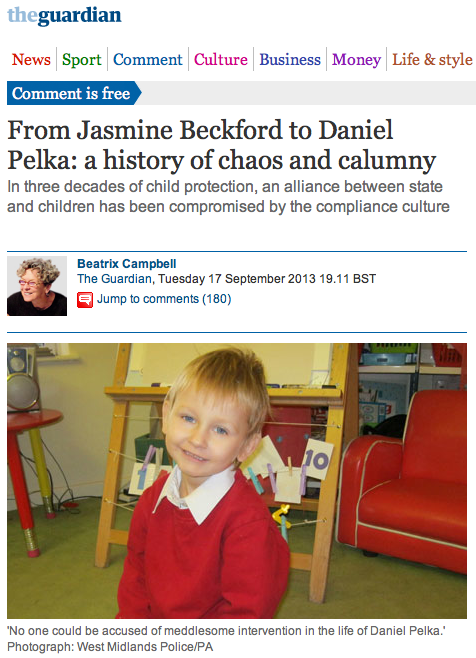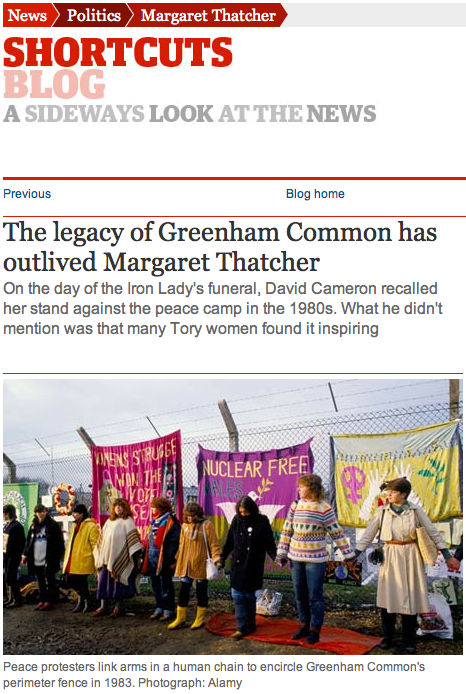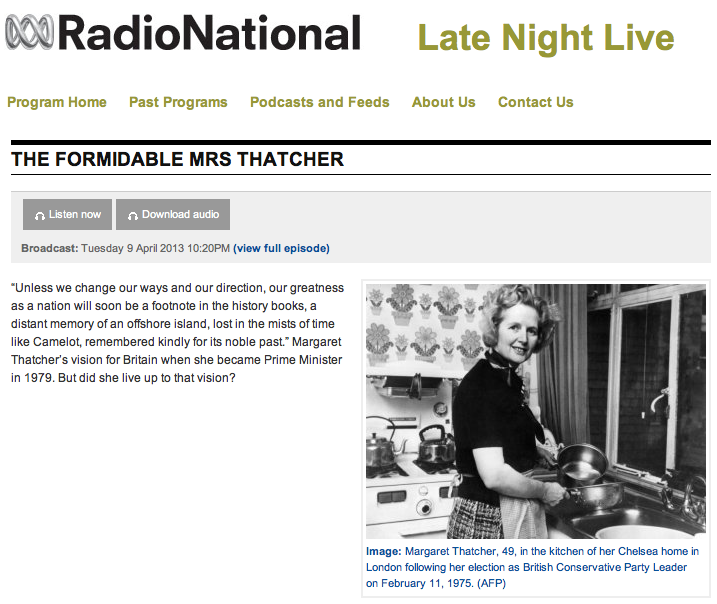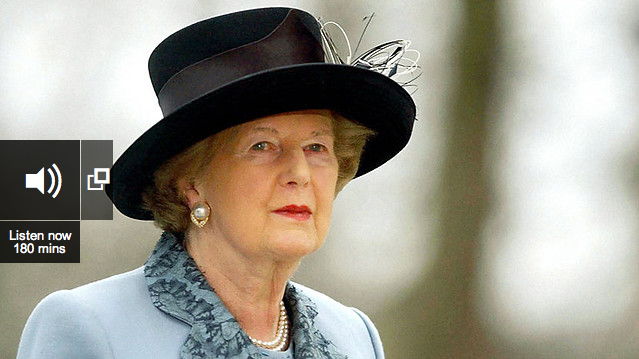In three decades of child protection, an alliance between state and children has been compromised by the compliance culture.
Author Archives: Beatrix Campbell
New Feminism is Fabulous
I was recently invited to join the discussion on BBC Radio 4’s Today programme with the wonderful Laura Bates, who launched Everyday Sexism.
Great. But it was set up as the New Feminism achieving more than the boring old feminism…
Madness: the new feminism is fabulous — women improvising political strategies out of their own experience and in the context of new cultures of sexism released by the web. As it should be: each generation confronting its own circumstances and creating its own movements.
The established media, however, suffers from historical amnesia as well as institutional indifference — it thinks of feminism as if it were Year Zero: nothing happened until yesterday. It doesn’t know what’s being going on because it doesn’t pay attention.
Every day the Today programme has a sports bulletin. Actually, it’s a bulletin about boys’ games.
But did you hear the programme interview the nursery nurses and classroom assistants who took on a cartel of 20 councils in Scotland over equal pay — fought them all the way to the Supreme Court and won last month?
Did we hear interviews with cleaners and cooks who challenged Europe’s biggest local authority, Birmingham, over a grotesquely discriminatory bonus structure — and won?
Did we hear the thousands of women trekking through the tribunals to make public authorities obey the equality law? Did we hear government being challenged about their readiness to bail out the banks, but their refusal right now to bail out local authorities facing historical comeuppance and monumental bills for their determined refusal to apply the law on equal pay – in effect, for stealing from women?
Do we hear about feminism’s impact in the last Labour government in radicalising the law on crimes of sexual violence, or its irreducible importance in making new labour introduce Sure Start — the best thing it ever did?
Each generation makes its own feminism — but it is as hard as it is because our national media ignores the feminist activism that already exists.
Dear Baby

Dear Duchess and Duke,
Welcome to your baby.
And Dear Baby,
Welcome to our world.
What would be the greatest gift that your parents could give you, baby: a republic, a republic in which you, like everyone else, would be affirmed not as supreme beings, sovereigns and subjects, but as citizens, born equal?
Now wouldn’t that be grand.
Wouldn’t it be grand to free you, baby, from the tradition of monarchy that has doomed a few young men to a privileged but pointless career as a prince, waiting, waiting, waiting for destiny: the death of the father; waiting to be useful – not as a breeding machine, not as a performer in pageants that proclaim your power, but as a person with a proper job.
Those of us who are honoured to belong to that mass called The People would welcome you to live as one of us. What could be better…than to be one of us?
Yours sincerely,
Beatrix Campbell
—
My comrade, the amusing Tory Quentin Letts, concluded his letter to the baby thus:
“Above all”, he said, “to thine own self be true.”
“That is the point”, I said: “That’s the one thing he may not do!”
A Domestic Goddess Is Only A Woman After All…
…and Charles Saatchi Shows Us What Domestic Violence Looks Like:
It is tempting to command Nigella Lawson to morph from her retro persona as domestic goddess, millionaire chef and TV flirt into a fully formed feminist heroine.
But the temptation should be resisted.
Australian DJ Dee Dee Dunleavy succumbed: she wrote that Nigella Lawson was ‘a beacon’ to women and if she wanted us to go on buying her books and watching her TV kitchen jaunts then ‘we need you to make a stand on domestic violence.’
British journalist Yasmin Alibhai Brown and I debated this on the Jeremy Vine Show this week.
Yasmin agrees. I don’t. Not because we wouldn’t be proud for her if she could come out and take a stand against men’s violence against women. Of course, we would. But we should hesitate before making any demands of this woman.
She has evidently endured rather a lot being bossed around. A man who thinks its OK to choke his wife in a public place is unlikely to be a first time offender. He has already demeaned her enough.
We don’t need to add our voices to her humiliation. What would we do if she couldn’t re-incarnate from consumer icon to campaigning heroine?
Blame her? Boycott her?
Whatever she does or doesn’t do, no one can erase those pictures of his hands around her throat — when Saatchi was caught in the act, when the world witnessed his menace, the cognitive distortions circulating around the Saatchi palace were subjected to public scrutiny and critique.
Now she knows that she is not alone, she is among friends — there are millions of women who know what she feels like, and it is to be hoped that she now knows that she is one of them.
Now he knows that he is a thug who abuses his wife.
It is to be hoped that she gets good support. It can’t come from her husband. In the days after The People published those pictures of him trying to throttle his wife in a public restaurant, he typically repeated the alibi of woman-beaters everywhere: it was only a tap — or as he put it, a ‘playful tiff’.
What is a ‘playful tiff’ exactly?
Well, he helpfully explained: he was trying to ‘emphasize a point’. Yes, we saw that. And the point was? ‘Shut up and listen to me…’
To ensure that his point was made he threatened her with a bit of throttling. Everything Charles Saatchi has said about his assault on his wife vindicates what we know from four decades of feminist activism against men’s violence against women: that woman-beating is megalomaniac and misogynist.
If feminism has a duty here it is not to blame her for what she can’t do, but — as most commentators are doing — encourage her to recover her dignity and do what she must do: protect her children by protecting herself. And if she can’t, yet, stand up for herself she must stand up for her children — she must not let make them witness her degradation by a man.
We might also suggest: enough with the domestic goddess; get down among the women. Like millions of other women she has been subjected to intimate oppression, she lives with violence on her horizon.
The genius of Women’s Aid refuges created by the women’s movement is that they work with the difficulty of women’s escape and empowerment — their ethic is not to blame women for their fears, for their failure to leave violent men, for their defeat.
On the contrary, they try to create the conditions in which women can repair themselves and discover new survival strategies that do not depend on their subordination.
Nigella Lawson won’t be the last woman to be hurt and humiliated by a rich and powerful thug. Her class won’t help her — the Establishment has shielded misogyny and violence against women for centuries.
But we can help her by directing blame where it belongs – not the victim but the perpetrator, not Ms Lawson but Mr Saatchi. He should not have been cautioned, he should have been charged.
His ex-wife piped up that the image of his hands round his wife’s throat should not be his legacy, that he had not being treated fairly. He might have said the same thing himself. Better, of course, to have a spurned wife say it for him.
What would be fair, Ms ex-Saatchi? And anyway, it’s too late — his legacy is already writ: the millionaire collector and propaganda supremo shows us what domestic violence looks like.
The criminal justice system, the Home Secretary and the Evening Standard for which he writes, have all allowed his power and influence to obscure what the rest of the world has now witnessed: a bullying bloke doing what so many men who beat up women do, choke a woman to shut her up.
Thinking Allowed: Remembering Diana
Did Princess Diana’s death lead to a major shift in British culture?
Have a listen to the discussion on BBC Radio 4’s Thinking Allowed:
Professor of Sociology, Vic Seidler, talks to Laurie Taylor about his new book which analyses the repercussions of Diana, Princess of Wales’, death in 1997. He argues that the public outpourings of grief and displays of emotion prompted new kinds of identification and belonging in which communities came together regardless of race, class, gender and sexuality and helped to make visible changes in what might be called ‘New’ or ‘post-traditional’ Britain. Did her unexpected death see a challenge to ‘stiff upper lip’ reserve and to the typical split made in modernity between reason and emotion?
The writer, Bea Campbell, who has also written about the Diana ‘phenomenon’, joins the discussion. Also, the anthropologist, Henrietta Moore discusses the history and significance of Ethnographic research.
You might also be interested in my book, Diana: How Sexual Politics Shook the Monarchy.
What Is Wrong With Men?
As part of BBC Radio 4 Today programme’s series about men, Beatrix Campbell, Tim Samuels and Laurie Penny debate how the place of men in society has changed.
You can listen to the broadcast here or by clicking the image below:
The Guardian: The Legacy of Greenham Common has outlived Margaret Thatcher
Late Night Live: The Formidable Mrs Thatcher
I’m a regular contributor to the Australian Broadcasting Corporation’s nightly flagship arts and current affairs programme Late Night Live.
Here’s my latest discussion alongside Matthew Parris, The Formidable Mrs Thatcher.
IRON LADY
From my book: THE IRON LADIES
Virago 1987
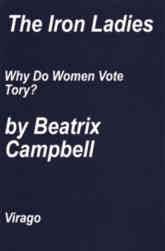 Margaret Thatcher’s friends and enemies would say: she’s just like a man! She is the best man among them!
Margaret Thatcher’s friends and enemies would say: she’s just like a man! She is the best man among them!
Uniquely in the public mind she belonged to one sex yet could be either. But she was not like a man; she was more than a man: a prime minister, a warrior and (allegedly) a housewife. Men are warriors and prime ministers but they are not housewives.
Part of women’s pleasure in Margaret Thatcher was everything to do with gender and her performance of power. But what did that say about femininity and its changing forms?
Thatcher was given the opportunity to engage with women’s political history, and she spurned it. For that would have involved acknowledging that first of all it was a struggle; a struggle to reach beyond the boundaries of domesticity to embrace power in the public sphere as well as responsibility in the private; and it would have posed the question: what was her own commitment to the political struggles of women in her own time?
All of that was impossible for Thatcher.
She insisted, ‘The battle for women’s rights has largely been won. The days when they were demanded and discussed in strident tones should be gone for ever. I hate those strident tones we hear from some Women’s Libbers.’
Margaret Thatcher invokes only the idea of the housewife, not the lived experience, she does not refer to her work, her isolation, her sacrifice, her other longings.
She made the domestic visible – but she made it the experience of women. But in making it visible she also rendered invisible the housewife also engaged in waged work and the contradictions experienced by the wageless housewife.
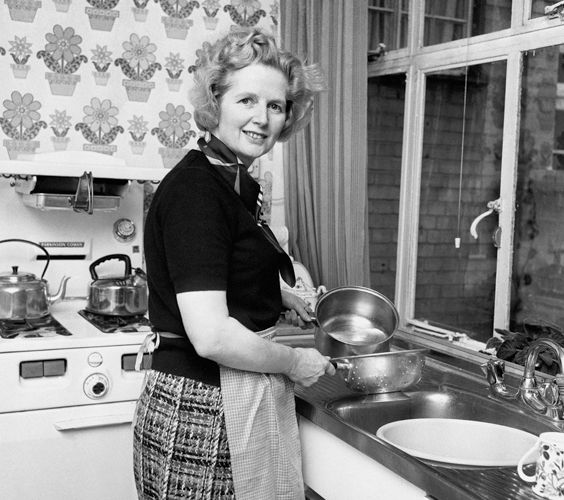
Credit: AP
State support is reconstituted as an inducement to sloth. Women’s powerlessness is suppressed in her division of society into two classes – powerful state bureaucratic elites and the manipulated masses, including trade union ‘barons’ and ‘bully boys’.
‘We never went on demonstrations or on strike,’ she said.
Thatcher’s politics are patriarchal, but that doesn’t make her a man.
She shows how femininity is a production: femininity is what she wears, masculinity is what she admires.
She puts femininity and power on display. It is not femininity, it is buccaneering masculinity that is evoked in her celebration of Victorian values, earlier prime ministers, merchant venturers, philanthropists… ‘This is a nation built on the success of the merchant venturers. Men who sailed into the unknown to carry our trade and bring back wealth to our people.’
Margaret Thatcher seeks something not given to women: valour.
She borrowed it – during the miners’ strike, the Falklands war, the resistance to détente…
‘I stand before you tonight in my evening gown, my face softly made up, my hair gently waved…the Iron Lady of the Western World! Me? A cold warrior? Well, yes…’
One of her advisers, Patrick Cosgrave, thought that some women who had been Labour voters might have been touched by the women’s Liberation Movement, and might be engaged by an emphasis on Thatcher’s sexual identity. But she ‘turned the scheme down flat’.
Many Conservative women felt disappointed that Thatcher did not empower women in the party. She was the triumph of an older tradition, albeit one that she herself transformed. She did not follow feminine archetypes in the Conservative Party, she preferred the prototypical patriarch: Churchill.
She was a model neither of traditional femininity nor feminism, but something else:
She offered feminine endorsement to patriarchal power and principles.
Margaret Thatcher is Dead
Barack Obama said that Margaret Thatcher was an iconic role model for our daughters.
Wrong.
Obama’s election as the first black president of the United States was a moment of vindication for black Americans.
His mantra during his election campaign, Yes We Can, could have been their maxim, too. Yes, black America, Yes WE Can!
But the election of Margaret Thatcher as Britain’s first woman Prime Minister offered no such promise. What she believed was Yes I Can.
She didn’t share power with women. She didn’t expand women’s democratic room for manoeuvre. On the contrary, she diminished democracy. She didn’t empower women.
Equality was a word purged from her vocabulary. And feminism, she believed, was ‘poison’. Without it, of course, she would never have become a Parliamentarian, a Prime Minister, or even a voter.

Unemployment in the Tees Valley stood at almost 20 per cent. Jobless Eric Fletcher found his way through the crowd to the Prime Minister, with his file containing all his job applications: more than 1000.
For sure, Thatcher proved that she could perform power like no man: she could be more than any man — but she wrapped a feminine endorsement around a thoroughly patriarchal project.
Her mission was to re-structure the state and society, and she engineered this with surgical elan; Thatcherism tilted the axis of British politics, she made the lore of the market appear to be the language of life itself.

After her third election victory, in 1987, Margaret Thatcher paid a visit to Teesside, a region laid waste by Thatcherism.
It was — as the great Jamaican scholar-activist Stuart Hall, the pioneering theorist of Thatcherism — described it a project of modernisation: REGRESSIVE MODERNISATION.
It spoke freewheeling free marketeering into one ear, he said, and ‘the voice of respectable, bourgeois, patriarchal man’ in our other ear.
Hear this fast, bracing debate between the lovely Tory MP Margot James and myself.
